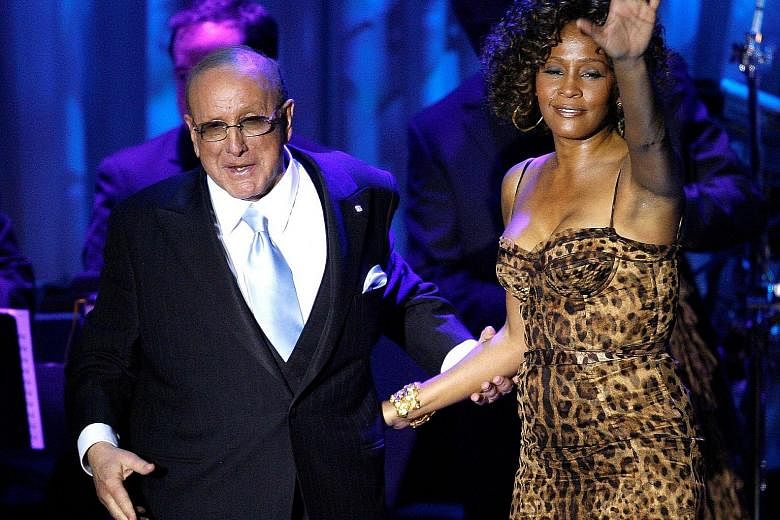NEW YORK • Downstairs at the Beverly Hilton Hotel on Feb 11, 2012, black cars delivered tennis player Serena Williams and singer Britney Spears to Clive Davis' 2012 Grammys party.
Upstairs in Room 434, the coroner's office tended to the body of his biggest star, Whitney Houston. She had been found dead in a bathtub.
Singer Chaka Khan later told CNN Davis' decision not to cancel his party was "complete insanity".
He is a legend in the music business. He signed Janis Joplin in 1967, turned Barry Manilow into a star in 1975 and orchestrated the reinvention of Aretha Franklin in 1980.
But his link to Houston cemented his status as a packager of talent. The albums she released between 1985 and 1998 had 11 No. 1 hits.
Now, a laudatory documentary about him, Clive Davis: The Soundtrack Of Our Lives (based on his own memoir), is colliding with a documentary about her.
The juxtaposition poses difficult questions about race and arrives at the conclusion that there was a psychological cost to being a black superstar whose image was constructed with the express purpose of maximum crossover.
Davis' film opened the Tribeca Film Festival late last month.
Then came the debut at the festival of Whitney: Can I Be Me, which casts her as a victim of the music business' demands.
In it, audiences found out that material for Houston that "was too black-sounding was sent back".
Kirk Whalum, who played saxophone on her tours, recalled that black people were calling her "White-ney" and a "sellout".
Her ties with Robyn Crawford, part of her camp from 1984 to 1999, was the subject of gossip.
Davis' position was that "an artist can be extremely gifted and yet remains unsuccessful if he or she records the wrong music, or gets an image that confuses potential audiences". That was from his first memoir from 1974.
From 1967 to 1973, he headed Columbia Records. He signed Joplin, Santana and Blood, Sweat & Tears.
Then he was fired over expense account violations. He started Arista where he signed Patti Smith, Lou Reed and Dionne Warwick.
His first queen at the label was Melissa Manchester. She had big hits, but learnt the cost of having an executive so focused on the marketplace.
"He always wanted me to be current and I always wanted to be timeless. It's a different way of looking at the same picture," she said.
Davis never liked being called a Svengali to Houston. But he was very hands-on - two weeks after he signed her, he went on The Merv Griffin Show and introduced her to the world.
In 1985, Whitney Houston was released and sold 15 million copies in the United States alone. In 1987, her next album arrived and four singles all hit No. 1.
But behind the scenes, she was increasingly under pressure by a family that depended on her.
In April 1989, she and Crawford attended the Soul Train Awards. When her name came up among the nominees for best female R&B/ urban contemporary single, a loud booing came from the audience.
That night, Houston met Bobby Brown for the first time. Three years later, they were married.
By now, she was promoting what would become her biggest commercial vehicle yet, The Bodyguard (1992), a demographic-pandering movie she had just filmed with actor Kevin Costner.
In 2000, Houston pulled out of a performance for Davis at his induction into the Rock & Roll Hall Of Fame. A few weeks later, she began singing the wrong song during an Oscars rehearsal and could not stay on key. She was fired.
Her 2002 album - made after Davis left Arista to start the new label J - tanked. They did reunite for her last album and she got divorced.
She seemed to be in good physical shape in February 2012, the week of the Grammys.
Davis went to her funeral.
Crawford posted a remembrance on Esquire's website.
"The record company, the band members, her family, her friends, me - she fed everybody," she wrote. "Deep down inside, that's what made her tired."
NYTIMES

